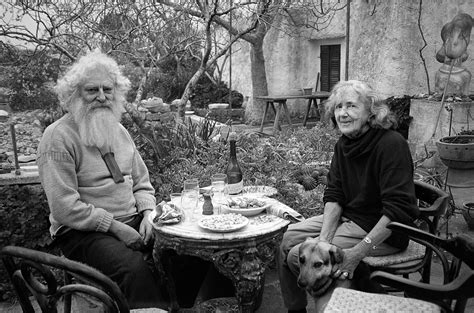A Quote by Epicurus
Death is nothing to us: for that which is dissolved is without sensation; and that which lacks sensation is nothing to us.
Related Quotes
Death is nothing to us: for after our bodies have been dissolved by death they are without sensation, and that which lacks sensation is nothing to us. And therefore a right understanding of death makes mortality enjoyable, not because it adds to an infinite span of time, but because it takes away the craving for immortality.
The virtue of a faculty is related to the special function which that faculty performs. Now there are three elements in the soul which control action and the attainment of truth: namely, Sensation, Intellect, and Desire. Of these, Sensation never originates action, as is shown by the fact that animals have sensation but are not capable of action.
We suffer from a hallucination, from a false and distorted sensation of our own existence as living organisms. Most of us have the sensation that "I myself" is a seperate center of feeling and action, living inside and bounded by the physical body-a center which "confronts" an "external" world of people and things, making contact through the senses with a universe both alien and strange.
You must squeeze out of yourself every sensation, every thought, every image, - mercilessly, without reserve and without remorse: you must search the darkest corners of your heart, the most remote recesses of your brain, - you must search them for the image, for the glamour, for the right expression. And you must do it sincerely, at any cost: you must do it so that at the end of your day's work you should feel exhausted, emptied of every sensation and every thought, with a blank mind and an aching heart, with the notion that there is nothing, - nothing left in you.
To begin depriving death of its greatest advantage over us, let us adopt a way clean contrary to that common one; let us deprive death of its strangeness, let us frequent it, let us get used to it; let us have nothing more often in mind than death... We do not know where death awaits us: so let us wait for it everywhere." "To practice death is to practice freedom. A man who has learned how to die has unlearned how to be a slave.
We are left with nothing but death, the irreducible fact of our own mortality. Death after a long illness we can accept with resignation. Even accidental death we can ascribe to fate. But for a man to die of no apparent cause, for a man to die simply because he is a man, brings us so close to the invisible boundary between life and death that we no longer know which side we are on. Life becomes death, and it is as if this death has owned this life all along. Death without warning. Which is to say: life stops. And it can stop at any moment.
Spend your time in nothing which you know must be repented of; in nothing on which you might not pray for the blessing of God; in nothing which you could not review with a quiet conscience on your dying bed; in nothing which you might not safely and properly be found doing if death should surprise you in the act.





































